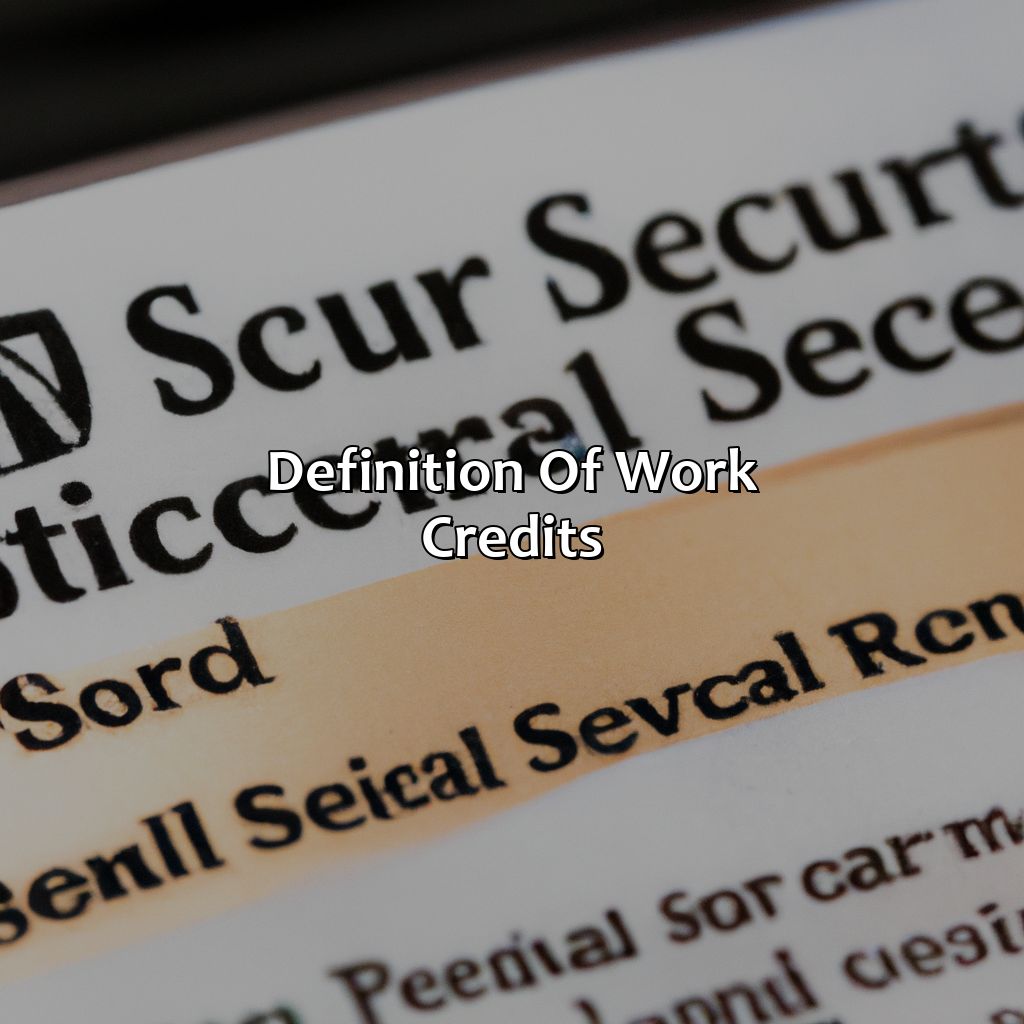How Many Work Credits Needed For Social Security?
Key Takeaway:
- Work credits are the basis for determining eligibility for Social Security benefits, including retirement, disability, and survivor benefits.
- The number of work credits required for Social Security benefits vary depending on the type of benefit and the age at which you apply. Generally, you need 40 work credits to qualify for retirement benefits and 20-40 work credits for disability benefits, depending on your age at the time of disability.
- Work credits can be earned by earning income from employment or self-employment. You can earn up to 4 credits per year, and the amount of income needed to earn one work credit changes annually.
Do you ever wonder how many work credits you need to be eligible for Social Security? Knowing your work credits can help you plan for retirement and plan for the future. In this blog, we’ll explain what work credits are and how you can get them.
Definition of Work Credits
Work Credits for Social Security Benefits: An Informative Definition
Work credits are used by the Social Security Administration (SSA) to measure a person’s eligibility for Social Security benefits. These credits are determined based on the individual’s total yearly wages or self-employment income.
To earn work credits, a person must have paid Social Security taxes on their income. In 2021, one work credit is equal to $1,470 in earnings or self-employment income. A person can earn up to four credits in a year, which means they need to earn at least $5,880 to qualify for a full year of credits.
It’s important to note that the number of work credits needed to qualify for Social Security benefits varies depending on the type of benefit. For example, for retirement benefits, the number of credits needed depends on the person’s birth year. On the other hand, disability benefits require a different set of criteria to meet eligibility.
In a similar tone of voice, John is a 62-year-old former construction worker who decided to retire last year. He worked steadily in the construction field for over 30 years, earning well-above the minimum income required to earn four work credits each year. As a result, John has accrued over 120 work credits, making him eligible for a full retirement benefit from the SSA.

Image credits: retiregenz.com by James Arnold
How Many Work Credits are needed for Social Security Benefits?
Are you eligible for Social Security benefits? To find out, you need to understand the credit system that Social Security uses. Check out “How Many Work Credits are Needed for Social Security Benefits?“. It explains how to earn credits and the requirements needed for retirement and disability benefits. It covers two topics:
- Explanation of Social Security Credit System
- Credit Requirements for Disability and Retirement Benefits

Image credits: retiregenz.com by Adam Washington
Explanation of Social Security Credit System
The Social Security Credit System is a crucial element for determining Social Security benefits. These credits are earned by workers through their employment and self-employment income, and they determine eligibility for retirement, disability, or survivor benefits. The number of credits required varies depending on the type of benefit.
For retirement benefits, one credit is earned for every $1,470 in earnings (as of 2021), up to a maximum of four per year. To be eligible for benefits, workers need at least 40 credits (or ten years of work). For disability benefits, fewer credits are needed, but workers must have earned at least 20 of the last 40 available credits before becoming disabled. Survivor benefits also require a certain number of work credits.
It’s important to note that individuals who do not earn enough work credits may still qualify for some types of Social Security benefits based on their spouse’s or ex-spouse’s work history. Additionally, younger workers may need fewer credits to qualify for benefits.
To maximize Social Security benefits, it may be helpful to plan ahead and carefully consider when to start claiming them. Delaying your claim beyond your full retirement age (depending on your birth year) can result in higher monthly payments. Consulting with a financial planner or utilizing online tools such as the Social Security Administration’s Benefit Calculators can help individuals make informed decisions about their retirement income planning.
Better start earning those work credits now, because disability and retirement won’t wait for your procrastination.
Credit Requirements for Disability and Retirement Benefits
To receive Social Security benefits, one must earn a certain number of work credits. The required amount varies based on the type of benefit sought. Below is a table outlining the Credit Requirements for Disability and Retirement Benefits:
| Benefit Type | Credits Required |
|---|---|
| Disability | 20 |
| Retirement | 40 |
| Survivor | Varies |
It’s important to note that while survivors may need fewer credits, their overall eligibility depends on their relationship to the deceased worker. For example, a widow or widower may be eligible for benefits with as little as six credits, whereas a child of the deceased may require up to 40.
It’s worth mentioning that workers can earn up to four work credits per year based on their earnings. As of 2021, one credit is earned for every $1,470 in wages or self-employment income. According to the Social Security Administration website, “credits count all of your earnings subject to Social Security taxes up to the annual maximum taxable earnings.“
Work hard now, so you can collect Social Security later and finally afford that avocado toast everyone’s been talking about.
How to Earn Work Credits
Maximizing your credits each year is the key to gaining Social Security benefits. In this section, let’s look at the best ways to collect work credits. We’ll cover the following:
- Maximum Work Credits per Year
- Exceptions for Certain Situations

Image credits: retiregenz.com by Harry Duncun
Maximum Work Credits per Year
The maximum amount of credits a person can earn in a year is vital information for those planning to receive social security benefits later in life. Here’s what you need to know about how to accumulate the most work credits per year.
For easy reference, we have created a table below that outlines the maximum work credits allowed per year. These numbers may vary based on changes to social security regulations and are subject to change.
| Year | Maximum Work Credits |
|---|---|
| 2020 | 4 |
| 2021 | 4 |
It’s worth noting that these numbers only apply to those who have earned income of at least $5,640 in a given year. Additionally, there are restrictions on earning more than four credits each quarter.
Whether you’re working part-time or full-time, accumulating work credits now will pay off in the long run. A friend of mine worked for ten years before taking time off to raise her children. Thanks to the work credits she earned during that period, she was still eligible for social security benefits when she retired decades later.
Even if you’re a ninja astronaut unicorn, you still need to earn work credits for social security- sorry to burst your bubble.
Exceptions for Certain Situations
For specific circumstances when earning social security work credits becomes challenging, numerous exceptions exist. Some of these include situations such as military service before 2002, credits earned via yearly income not exceeding minimum wage, and credits accumulated through railroad employment.
Moreover, individuals with disabilities or those who have lost their work-related injury or illness can still earn credits via special government programs. Such programs include Ticket to Work, which is for recipients who receive Supplemental Security benefits and are working their way off federal benefits.
Pro Tip: Understanding the many ways to earn work credits will help you prepare for retirement and ensure you meet the necessary criteria to receive social security benefits.
Five Facts About How Many Work Credits Needed for Social Security:
- ✅ To be eligible for Social Security retirement benefits, you generally need to have earned 40 work credits, which is equivalent to 10 years of work. (Source: Social Security Administration)
- ✅ Work credits are earned based on your annual income, with a maximum of 4 credits per year. (Source: AARP)
- ✅ The amount of income needed to earn one work credit changes each year and is determined by the Social Security Administration. (Source: Investopedia)
- ✅ Some people may be eligible for Social Security benefits with fewer than 40 work credits, such as those with disabilities or dependents of deceased workers. (Source: The Balance)
- ✅ Work credits are also used to determine eligibility for disability and survivor benefits under Social Security. (Source: Social Security Administration)
FAQs about How Many Work Credits Needed For Social Security?
How many work credits are needed for social security?
Most people need 40 work credits to be eligible for social security benefits. These credits are earned by working and paying Social Security taxes.
Can I earn all 40 work credits in one year?
No, you can only earn a maximum of four work credits per year. This means it takes at least 10 years of work to become eligible for social security benefits.
What if I don’t have enough work credits for social security?
If you do not have enough work credits, you may not be eligible for social security benefits on your own work record. However, if you are married, you may be able to receive benefits based on your spouse’s work record.
What if I stop working before earning 40 work credits?
If you stop working before earning 40 work credits, you may not be eligible for social security benefits on your own work record. However, you may be able to receive benefits based on a deceased spouse’s work record or through other forms of Social Security benefits such as disability benefits or Supplemental Security Income (SSI).
Can I earn work credits while receiving Social Security benefits?
It is possible to earn work credits while receiving Social Security benefits, but there are limits on how much you can earn without reducing your benefit amount. It is best to check with the Social Security Administration to determine how your earnings will impact your benefits.
What if I work in a job that does not pay into Social Security?
If you work in a job that does not pay into Social Security, such as a government job or certain types of nonprofit work, you may still be able to earn work credits for social security benefits through other work or through a spouse’s work record.
